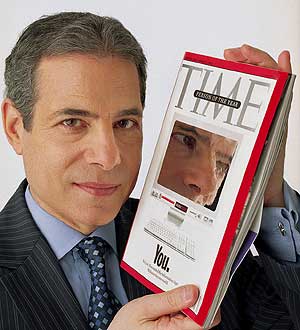Times Magazine’s Man of The Year 2006
Congratulations! You are the Time magazine ”Person of the Year.”
The annual honor for 2006 went to each and every one of us, as Time cited the shift from institutions to individuals — citizens of the new digital democracy, as the magazine put it. The winners this year were anyone using or creating content on the World Wide Web.
Read the story direct – Person of the Year 2006
[swf width=”374″ height=”272″]http://www.time.com/time/personoftheyear/2006/flash/poy2006.swf[/swf]

Time magazine Editor Richard Stengel, holds the Time Person of the Year magazine. And the winner is you: anyone using or creating content on the World Wide Web.
“For seizing the reins of the global media, for founding and framing the new digital democracy, for working for nothing and beating the pros at their own game, Time’s Person of the Year for 2006 is you,” the magazine’s Lev Grossman wrote.
The magazine has put a mirror on the cover of its “Person of the Year” issue, released on Monday, “because it literally reflects the idea that you, not us, are transforming the information age”, Editor Richard Stengel said in a statement.
You beat candidates including Iran’s President Mahmoud Ahmadinejad, China’s President Hu Jintao, North Korean leader Kim Jong-il and James Baker, the former US Secretary of State who led Washington’s bipartisan Iraq Study Group.
Time has been naming its person of the year since 1927 and the tradition has become the source of speculation every year, as well as controversy over unpopular choices such as Adolf Hitler in 1938 and Ayatollah Khomeini in 1979.
The aim is to pick “the person or persons who most affected the news and our lives, for good or for ill, and embodied what was important about the year, for better or for worse”.
Grossman said the creators and consumers of user-generated internet sites showed a community and collaboration on a scale never seen before.
“It’s about the many wresting power from the few and helping one another for nothing and how that will not only change the world, but also change the way the world changes,” said Grossman, Time’s technology writer and book critic.
“The tool that makes this possible is the World Wide Web,” he said. “It’s a tool for bringing together the small contributions of millions of people and making them matter.”
MySpace – bought by media giant News Corp last year for $US580 million – has more than 130 million users around the world and adds around 300,000 members a day, while YouTube – bought by internet search leader Google last month for $US1.65 billion – gets about 100 million daily views.
“These blogs and videos bring events to the rest of us in ways that are often more immediate and authentic than traditional media,” Stengel said.
“Journalists once had the exclusive province of taking people to places they’d never been. But now a mother in Baghdad with a videophone can let you see a roadside bombing or a patron in a nightclub can show you a racist rant by a famous comedian,” he said.